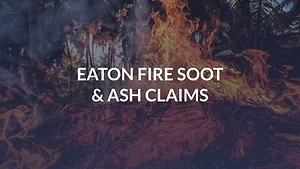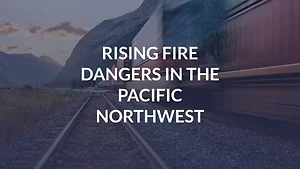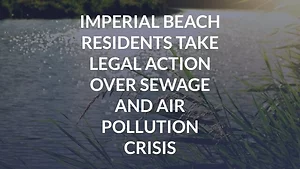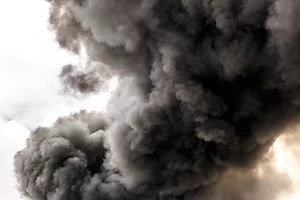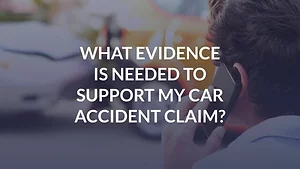A recent investigation by The Wall Street Journal has revealed a pattern of toxic fume events aboard commercial aircraft where air contaminated by chemicals such as fuel, hydraulic fluid, and lubricating oils seep into the cabin’s air supply.
These leaks occur due to a design element known as ‘bleed air’ in which the air that you breathe is pulled through the aircraft’s engine. Oils can enter the air when seals wear out, where they are vaporized by the heat and release a number of toxic compounds into the air that is then circulated into the aircraft cabin. This ‘bleed air’ ...
The Eaton Fire burned over 14,000 acres between January 7 and January 31, 2025, in the foothills of the San Gabriel Mountains. In its wake, 18 people died, and nearly 9,500 structures were destroyed. Fueled by dry brush and intense Santa Ana winds, the fire spread quickly and affected residents for miles beyond the burn zone. The strong winds carried soot and ash for miles, blanketing homes, vehicles, and businesses across Los Angeles County and surrounding areas. Many property owners who were never in evacuation zones still suffered serious damage.
How Soot and Ash Can Affect Your ...
Wildfires have always been part of the Pacific Northwest’s landscape, but recent years have shown just how devastating they can become. Rising temperatures, prolonged droughts, and high winds have created conditions where a single spark can fuel massive destruction. While many fires start from lightning strikes or human activity, another significant source of ignition comes from railroads and utility companies. Trains and electrical infrastructure move through some of the most fire-prone areas of Washington and Oregon, and their operations can pose serious risks if not ...
For decades, the Tijuana River has carried millions of gallons of untreated sewage and industrial waste from Mexico into San Diego’s South Bay. This toxic flow empties into the Pacific Ocean, causing more than 1,300 consecutive days of beach closures and exposing nearby communities to dangerous levels of pollution.
Residents of Imperial Beach and surrounding neighborhoods have long reported foul odors, eye and throat irritation, respiratory problems, fatigue, and persistent headaches. New scientific research confirms what locals have been saying for years: that sewage ...
Consumer fraud is an ever-growing threat that affects millions of Americans each year. Recent data shows that one in three people has been scammed in the past year alone, with Americans losing over $12.5 billion to fraud – a staggering 25% increase from the previous year. These numbers reveal not only the widespread reach of scams but also their evolving nature, becoming more sophisticated and difficult to detect.
Consumer fraud occurs when someone uses deception to steal your money or personal information. Scammers often impersonate trusted companies or government agencies to ...
The Pickett Fire, burning just outside Calistoga in Napa County, as of August 26, 2025, has scorched more than 6,800 acres since it started on August 21, 2025. Over 2,000 fire personnel remain on the scene, working with helicopters, engines, and bulldozers to contain the blaze. While some evacuations have been lifted, others remain in effect as the fire sits at just 17% containment.
Officials report that much of the fire’s footprint overlaps with the 2020 Glass Fire burn scar. Even so, the current blaze continues to generate heavy smoke, raising alarms for one of Napa Valley's most ...
On August 22, 2025, an explosion and massive fire broke out at the Smitty’s Supply facility in Roseland, Louisiana, forcing hundreds of residents to evacuate and leaving a trail of oily soot and contaminated runoff in its wake. While no injuries were reported, the incident has shaken Tangipahoa Parish and raised new concerns about the safety and oversight of industrial facilities.
The facility’s history of environmental violations only adds to the gravity of the situation. According to EPA records, Smitty’s Supply has been cited for significant Clean Water Act violations ...
You have the right to pursue compensation for your car accident injuries if someone else caused you to get hurt. As the plaintiff, you carry the burden of proof. To win your car accident case and carry the burden of proof, you’ll need evidence supporting your claims.
Evidence can include many things, including physical items, documents, or statements, that help to show that your claim is more likely to be true than not.
The more evidence you have to support your case, and the stronger it is, the more likely it becomes that you’ll receive a meaningful settlement offer during ...
You’ll have a single opportunity to seek compensation for your medical bills, lost wages, disability, and other damages after a truck accident. You must do everything you can to make the most of it. The single best decision you can make to facilitate your fight for compensation is to hire attorneys with plenty of experience in trucking accidents to represent you.
The trucking company and its insurance carrier will do whatever they can to deny your claim or get you to accept way less money than you deserve. They’ll have an undeniable advantage from the beginning. You can change that in ...
Car accident cases don’t go right to trial. Instead, there’s a lengthy legal process that precedes trial, including private settlement negotiations between the parties, formally filing a lawsuit with the court, discovery, pre-trial motions, and then more negotiations. Sometimes parties go to arbitration to avoid the time and expense of going to trial, too. If and when settlement negotiations are unsuccessful, for whatever reason, your car accident case will go to trial.
There are a lot of reasons why your car accident case might not settle, and it might then be necessary to ...


